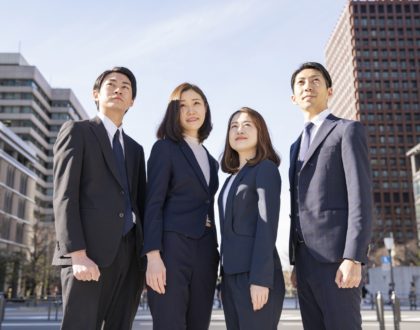Freelancing in Japan as a Foreigner – A Guide

by Florian
Freelancing in Japan as a non-Japanese requires a whole bunch of paperwork – but it’s possible. Check out this guide if you’re thinking of working in Japan, but don’t like the idea of being tightly bound to one company for all your income.
This guide covers:
- – Visa requirements
- – Requirements for freelancing work
- – Visa renewal procedure as a freelancer
- – Optional steps for covering all your bases
コンテンツ
Is there a Japanese Freelancing Visa?
Japan doesn’t have a dedicated visa type for freelancers. It is possible to do work freelance, even as a foreigner. But to get a proper visa and status of residence (在留資格) in the first place, you need a sponsor (read: a company that employs you). In other words: Doing freelance work in Japan is only possible if you’re already in the country with a valid visa.
When first coming to Japan for work, you have to find an employer and get a regular working visa like everyone else. The most common visa for foreigners in Japan is “Engineer/Specialist in Humanities/International Services”. It covers a very wide range of job types and is quite flexible. Still, before changing jobs/going freelance, you should always make sure that your new jobs match your visa category. Not doing so increases the risk of not getting your visa renewed. It may be a bit of a hassle, but when your ability to stay in the country is on the line, it’s better to be safe than sorry.
READ ONAll you need to know about Japanese visa types
Going Freelance – Step by Step
Just like there’s no freelancer visa, there’s also no such thing as a “freelancer application.” From an immigration standpoint, what you do is switching work status from an employee with a single employer to a sole proprietor with multiple clients. Aside from that, it’s very similar to a regular job change. (Find out more about job changes in Japan here.)
As long as you keep doing work that falls within your visa category, becoming a freelancer doesn’t change your visa status. Because of this, you can technically shift to freelancing before renewing your visa. Especially if you have a visa that’s valid for longer than 1 year, you might not want to wait until your time is about to run out before making the switch. The catch is: If you do it wrong, there’s a high chance of not getting your next visa renewal approved. No matter what you do, always check with your local Immigration Office (or a lawyer) in advance. You want to make sure that what you do will have no negative effects on future visa renewals.
Freelancing Requirements
To work freelance in Japan, you have to meet the following requirements:
- – Work contract*
- – Contract duration of at least 1 year
- – Main contract with an employer inside Japan**
- – Proof that you will have a stable income of at least 200,000 JPY per month on average
- – Work matching your visa/status of residence
*Multiple contracts/employers are possible. Common contract types for freelancers are 業務委託契約, 請負契約, or 委任契約
**There is no clear info on this, but chances are you’ll get harsher looks and treatment from immigration when most or all of your work comes from overseas
Working as a freelancer in Japan is sometimes referred to as “self-sponsoring” your visa. But these requirements show that there’s really no such thing. It’s possible to work for multiple employers and change them as you see fit, but you still always need at least one sponsor company. This sponsor will handle the paperwork necessary for your visa renewal. To prevent trouble down the line, pick as your sponsor one main client that you’re on good terms with and can count on. The others can be additional clients that prop up your monthly income.
Visa renewal procedure for freelancers
As long as you fulfill the requirements above and have all the necessary documents ready, you should have no problems with renewing your visa. The process is similar to a regular visa renewal, except that you have to submit a lot more paperwork.
What you need to prepare/bring:
- – Filled “Application Form for the Extension of Period of Stay” (在留期間更新許可申請書), based on visa type >>>Download here
- – Your residence card
- – Your passport
- – 40mm x 30mm photograph >>>See this site for reference
- – Contracts and other documents from all of your employers that show:
- ・The contract length
- ・Your income from the job
- ・Number of working hours
- – 在職証明書 (Certificate of Employment) from your current employer(s)
- – 退職証明書 (Certificate of Retirement) from your former employer
- – 給与所得の源泉徴収票 (Tax certificate slip) for the previous year
- – 個人事業の開業・廃業等届出書 (Notification of Opening/Discontinuation of Sole Proprietorship), stamped at your local tax office (税務署)* >>> Template from the National Tax Agency (PDF download)
- – Permits for activities that fall outside of your visa category (if you’ve applied for any >>>see below)
*It might be obvious, but you have to fill and file this before you start freelancing (not a few weeks/months before visa renewal)
Where you need to go:
– Your local Immigration Services Office >>>Full list here
Optional Steps
In addition to the steps above, you can also get the documents below. These are either fully optional or necessary under specific circumstances.
Certificate of Authorized Employment
If you’re not sure whether a job you’re planning to do is in line with your visa status, you can get a “Certificate of Authorized Employment” (就労資格証明書). This step is 100% optional. Not getting this certificate will not get you in any trouble, as long as everything else is taken care of properly. It’s just a way for you (and your future employer) to check if everything is in order. One certificate costs 1,200 JPY.
What you need to prepare/bring:
- – The application form >>>PDF download
- – Permits for activities that fall outside of your visa category (if you’ve applied for any >>>see below)
- – Your passport
- – Your residence card
Where you need to go:
- – Your local Immigration Services Office >>>Full list here, OR
- – Your local Immigration Information Center >>>Full list here
Permit for Work outside of your Visa Category
All work you do in Japan has to match your visa category. For work outside of that category, you need to apply in advance. Luckily, the process is pretty simple. All you have to do is to hand in the form “Application for Permission to Engage in Activity Other Than that Permitted under the Status of Residence Previously Granted”. (What a ridiculous name – but the Japanese term isn’t exactly short and snappy either: 資格外活動許可申請書)
What you need to prepare/bring:
- – The application form >>>PDF download
- – A document clarifying the details of the activities you’re planning to do
- – Your passport
- – Your residence card
Where you need to go:
- – Your local Immigration Services Office >>>Full list here, OR
- – Your local Immigration Information Center >>>Full list here
Getting this approved allows you to do the activity you applied for a certain amount of time (1 year seems to be common). If you want to do multiple for-profit activities outside of your visa category, you have to submit an application for each of them. Each permit costs 1,200 JPY.
First step: Level up your Japanese
As you see, freelancing in Japan as a foreigner is not impossible. But it requires a lot of preparation and savviness when it comes to dealing with immigration and all sorts of paperwork. Also, while there are some options for freelancing, starting out as a freelancer sadly isn’t one of them.
Considering that making the switch not only involves finding a regular employer first, but also filling and filing (Japanese-only) documents like the sole proprietor opening notification, brushing up your Japanese should be one of your top priorities. Linguage Japanese Language School in central Shinjuku specializes in preparing foreigners for work in Japan. If you’re serious about working in Japan, have a look at their website (link below). You can also check out more info on the school here.
Linguage Japanese Language School
Recommended Posts

How to Get Along with Your Japanese Boss
25 5月 2021 - Work, Working Culture

The 10 Most Popular Japanese Companies in 2021
19 5月 2021 - Work

